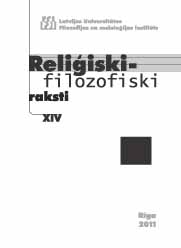„Mēmā Dieva” problēma un trīs tās iespējamie risinājumi „klasiskās” un „anarhistiskās” ateoloģijas kontekstā
The Problem of the „Dumb God” in the „Classical” and the „Anarchistic”Atheology
Author(s): Ilze JansoneSubject(s): Christian Theology and Religion
Published by: Latvijas Universitātes Filozofijas un socioloģijas institūts
Summary/Abstract: The present article is concerned with the problems of perceiving of God in the postmodern world. Various philosophical and theological trends offer different conceptions of God. The article proposes to deal with just one such conception, which may be attributed to the relatively early stage of postmodern cogitation, namely – the „Death of God” theology, or as it is sometimes called – atheology. This trend has been influenced by German thinker Friedrich Wilhelm Nietzsche, and springs from his well-known dictum to the effect that „God is dead”. The argument of the present article is developed in four stages. The first stage offers a general description of atheology against the background of postmodern thinking, and formulates the problem of the proposed research by posing the logical question of how can a „dead God” speak in the first place? Is there a possibility for a human person to communicate with a God that is „dead” or „dumb”? Various solutions to this problem are discussed and evaluated. The second part of the article proposes to view the problem in the light of Wetern mysticism, where it appears in the form of „individual resentment”. This concept seems to stand in opposition to the doctrine of atheology, yet it upholds the possibility that God has hidden Himself. The chief justification for involving of the problem of mysticism in the discussion is, in the view of the author, the fact that Georges Bataille – „the pioneer of atheology” (alongside the „father” of atheology F. Nitzsche himself) – are often characterized as mystics. The next step is concerned with the problems of language and the anlyses of T. A. Altizer`s views. Altizer accentuated the fact that the only way that makes it possible to talk about God is through personal experience of Jesus Christ (he describes this approach as the „classical atheology”). Christ is seen as the totality of history, thus holding before the human being a vision of apocalyptic outcome. The model of „classical atheology” confronts the world with Christ and opens up the possibility of a dialogue. This dialogue has to be engage in within the mainstream Christian tradition. The fourth part of the article deals with Bataille`s solution of the „Dumb God” problem. The author of the article designates it as an „anarchisic atheology”, partly because Bataille has never claimed to be a philosopher or a theologian. He tackles the problem in the terms of presence or absence of a literery narrative. The author relies on W. Hamilton`s position concerning the „death of God” culturalogical implications, and consequently – proposes to view Bataille`s approach as recognizing the possibility of communication between the ‘Dumb God” and a human person, due to the mystical character of a literary narrative.
Journal: Religiski-filozofiski raksti
- Issue Year: XIV/2011
- Issue No: 1
- Page Range: 31-54
- Page Count: 24
- Language: Latvian

